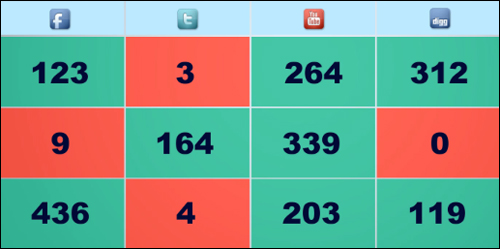 Social interactions and recommendations like Facebook likes, comments, and shares, +1s on Google+, etc. are called social signals.
Social interactions and recommendations like Facebook likes, comments, and shares, +1s on Google+, etc. are called social signals.
With the increased importance of social media sites like Twitter and Facebook, search engines like Bing and Google now take into account a range of social signals to help determine a site’s ranking.
![]()
Note: Google encourages website owners to build their brand on social media as a long-term investment to drive qualified traffic, instead of aiming for short-term benefits like search ranking placement. Google’s own head of the web spam team Matt Cutts has stated that Google takes a cautious approach when it comes to social signals, as social trends and relationships can change at a moment’s notice. Without a reliable ‘map,’ Google is understandably reticent to assign more importance to social signals over other aspects of their search algorithm. In summary, Google’s strategy is to “wait and see” how things develop over time, as websites that provide value normally develop longevity, trust and authority, and these are the websites that Google wants to display higher in its search results.
Social Signal Sources
Social sites that search engines look to for measuring social signals include:
With more than 1.5 billion active users, Facebook is the most dominant social media community on the planet. Research shows that one great post can reach up to 150,000 users, so even if no one is buying your products or services on Facebook, don’t be quick to dismiss Facebook as an important part of your business strategy, as Google processes data and information from Facebook to help determine your search rankings. In fact, Facebook seems influence website rankings more than other social media sites, like Twitter orGooglePlus.
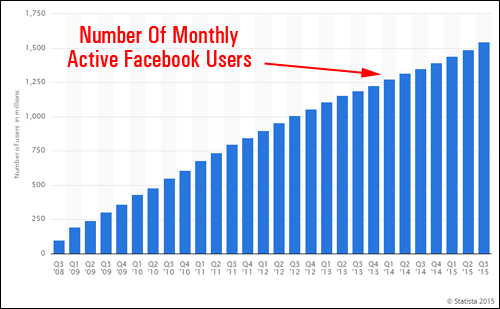
(Number of monthly active Facebook users. Source: Statista.com)
After Facebook, Twitter is the next biggest social media site in the world, with over half a billion tweets sent out every single day. Twitter has a significant amount of influence on the cybersphere and places great importance on tweeting posts that provide value to readers over the amount of tweets sent …
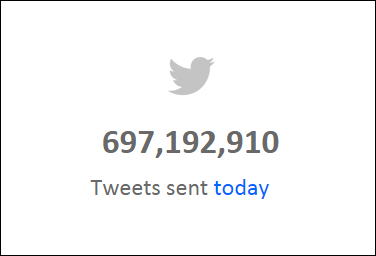
(Over 500 million tweets are sent each day. Source: InternetLiveStats.com)
Google Plus
Google’s own social networking site naturally carries a significant degree of authority online, even if it has not reached the same level of growth and take up as Facebook and Twitter.
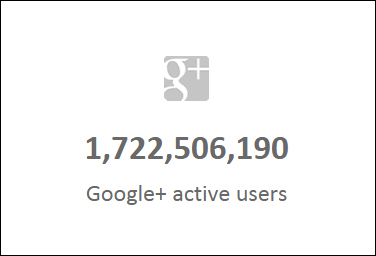
(More people are actively using Google+ every month. Source: InternetLiveStats.com)
In addition to the big three social sites listed above, there are a number of other social media networks that should not be ignored, like Pinterest, LinkedIn, Digg, StumbleUpon, and Reddit.
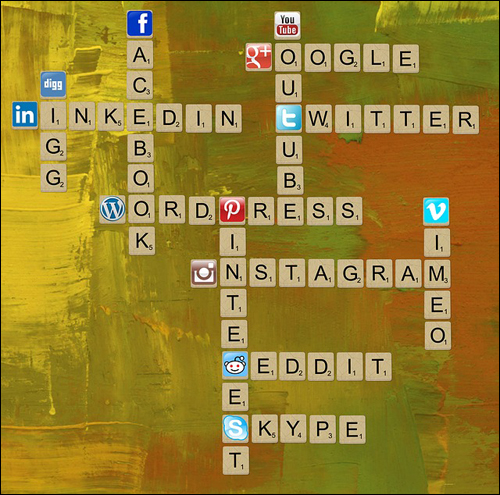
(A number of social sites provide important signals to search engines that could affect your rankings)
Which Social Signals Should You Pay Attention To?
Social signals tracked by search engines like Bing and Google include the following:
- Facebook – e.g. how many Facebook comments, shares, and likes a person has, growth rate of likes and shares, etc.
- Twitter – e.g. how many tweets and retweets a web page has, how influential the person sending a tweet is, trending topics, etc.
- Google+ – e.g. who is following you (influential users), how many followers on GooglePlus your site page has, spread rate of adds and shares, etc.
- Other sites – e.g. growth rate of Pins and re-Pins on Pinterest, comments on Reddit, etc.
- Not so obvious signals – In addition to the above, there are other not so obvious social media-related factors that can influence search rankings and traffic. These include positive and negative factors, such as improving clickthrough rate [positive], and whether your site is deemed to be irrelevant by visitors [negative].
As a business owner, it’s not only important to develop your social media presence, but also to be able to monitor, measure and analyze your social signals in order to improve your business results.

(Use social media to improve your results online)
Social media monitoring allows you to gain insights into your company’s overall visibility on social media, measure the impact of your marketing campaigns, avert impending crises, identify new market opportunities, and assess competitor activity and market share. Additionally, social media monitoring can also provide vital information about emerging trends and what consumers and clients think about specific products, businesses, topics, or brands.
As a business intelligence tool, social signal monitoring is invaluable. Using social media monitoring as a form of business intelligence, however, is a complex undertaking, often carried out by various people including marketing professionals, online reputation management (ORM) companies, market researchers, social marketing agencies, professional sales reps, and social engagement and community staff. Typically, smaller businesses don’t have the budget to pay media monitoring professionals to track their coverage in the and actively monitor their digital reputation.
Fortunately many providers have made available tools that facilitate the tracking of a wide spectrum of social media channels, enabling you to identify and even predict what consumers are saying about your brand or products so you can react to conversations and engage with online users in various social media platforms.
![]()
We have created a detailed article where we explore a number of social media measurement tools that will help you identify new trends and opportunities, track competitor activity, see what online conversations are taking place that could affect your business,etc. More info:

(Can you measure social signals effectively?)
In this article, we discuss a simple social tracking plugin for a WordPress-based online business and increasing your social media influence online.
Let’s Review …
Social Metrics Pro – Social Analytics For WordPress
Description
SocialMetricsPro is an easy-to-use social media analytics plugin for WordPress that is designed to help you increase your social media influence online in an uncomplicated way. It is built on a simple concept – the plugin measures how each signal is performing and displays either a red or green indicator. Your task is simple … change reds into greens.
(SocialMetricsPro provides a system that any website owner can operate … turn all the reds into greens!)
Colors indicate relative popularity. This simplifies your social analytics with Excel-like conditional color formatting. Posts with highest number of shares are colored green. Posts with low social media activity display amber and red.
The plugin developers tested Social Metrics Pro on a network of 2,000+ websites over a period of 3 months. During this period, all they focused on was turning the “reds” to “greens” and then keeping their metrics on “green”. From these tests, they noticed a 360% improvement in traffic for their top 10 performing sites, 410% more keywords ranked in the first page of Google and they also experienced a 310% increase in revenues.
(According to Social Metrics Pro developers, improving your social media marketing can result in better search rankings, increased web traffic and increased revenue!)
Learn more here:
Plugin Benefits
Below we have listed just a few of the benefits and advantages of using SocialMetricsPro to track Likes, Tweets, Pins, +1s and more from your WP Dashboard on your site:
Fast And Easy To Install And Set Up. Ready To Start Using In No Time.
SocialMetricsPro is really easy to install. Simply upload it to your Plugins folder via your admin login and activate.
Simple To Use
As mentioned earlier, the user’s job is to change red squares into greens. The plugin tracks and measures social signals the way Google sees it so you know which campaigns require investing more effort and which ones need to be better optimized.
Track The Social Signals From The Networks You Care About
Social Metrics Pro lets you track and monitor social activity across leading social media networks like Facebook, GooglePlus, Twitter, Pinterest, LinkedIn, StumbleUpon, and Digg.
Social Metrics Pro lets you easily answer questions like:
- Which social media networks work best for my site?
- Which social campaigns are performing the best on these social networks?
- Which are my most popular posts?
- And more …
With SocialMetricsPro, all this information can be accessed with a single click.
(Social Metrics Pro actively monitors social signals from the sites that you care most about!)
Plugin Features
Social Metrics Pro offers a number of features to WP users. Here are just some:
- Fast and simple to install and set up. Be up and running in minutes.
- SocialMetricsPro Is Widgets And Extensions Ready. You can extend its functionality using built-in and external widgets. Access updated information from your WP admin bar, add social content to your sidebar or anywhere in your site using widgets.
- One-click updating. You can update SocialMetricsPro in a single click via the WordPress Updates screen, or update the manually manually. You can also choose to receive an email notification whenever a new version is released.
- Low server resource consumption. Reporting is in seconds, using little server resources. Reports also include the amount of time used to retrieve the information and the server memory consumed when gathering and compiling data.
Additional features include:
- Sorting, Searching & Filtering Features: Social Metrics Pro allows you to sort and filter the data as you like. You can perform keyword searches to study posts related to certain topics, and even filter the results by category, publishing date, post type, or post authors.
- Export Data: You can export data to Excel for further analysis. Data can be exported in tab-delimited and comma-separated file formats, and imported to Excel or the spreadsheet application of your choice.
(SocialMetricsPro is very simple to use … just change all reds into greens!)
Testimonials From Users
Here are a few of the testimonials and comments users have provided for the Social Metrics Pro plugin:
”Social Metrics is the easiest way to see at a glance which posts have performed well on social networks.” Kevin Muldoon, Founder of WPMods.com
***
”Social Metrics is one of the recipes for Social WordPress. You can integrate it quickly and easily on your WordPress site to view your performance on social networks” Jean-Francois Arseneault, Arseneault Consultation (WordCamp Montreal 2011)
Social Metrics Pro Plugin – Useful Tips
SocialMetricsPro comes with a step-by-step guide on how to optimize your campaigns and improve your social media strategy (i.e. turn reds into greens).
Plugin Support
SocialMetricsPro is well-supported, and comes with free lifetime updates and support, backed by a risk-free, sixty-day, complete refund guarantee.
Product Pricing
SocialMetricsPro plugin is available in two editions:
- Single Site Licensing – This lets you activate Social Metrics Pro on a single site. Includes free lifetime updates and support. Cost = $27.00 (one-time).
- Multi-Site Licensing – This enables you to use Social Metrics Pro on multiple domains that you own. Cost includes free lifetime upgrades and free support. Price = $47.00 (one-time).
Please Note: Price details for this product depends on whether there are any promotions or limited-time specials being offered. The above reflects the price when this content was written. This may or may not be the actual pricing set by the product seller when you visit the plugin site and there may be additional upsells or one-time offers after your purchase.
Check the plugin’s website for the latest pricing details here:
Additional Information
SocialMetricsPro requires a self-hosted installation of WordPress and can be instantly downloaded after purchase.
Install The Plugin
As mentioned earlier, Google has been elevating the importance given to social signals as part of its ranking algorithm.
No website owner can afford to ignore how important social media is to their online success. SocialMetricsPro solves the problem of how to find a simple, time-saving solution that gives users immediate feedback on the success of their social marketing campaigns and guides them where and how to direct their efforts in order to improve their results.
SocialMetricsPro is an ideal tool for beginners and advanced WordPress users alike. It tracks Tweets, Likes, Pins, +1s and more right from your WP dashboard.
We recommend getting this plugin if you own or manage WordPress sites and would like to save time and resources by focusing on under-optimized social media campaigns.
For more details, visit the plugin website here: SocialMetricsPro – Social Analytics Plugin
***
***
